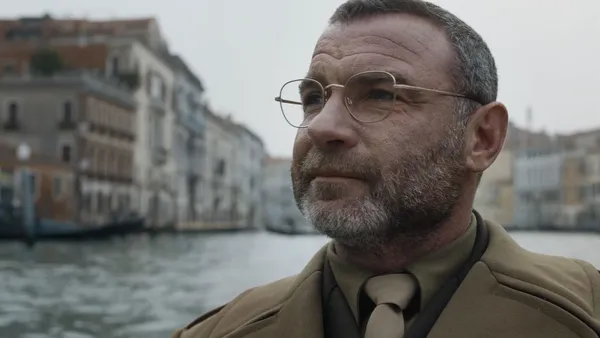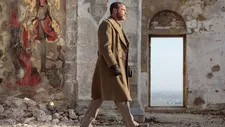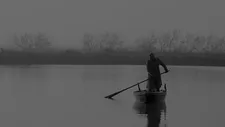 |
| Liev Schreiber in Across The River And Into The Trees |
There are many theories about how the magic gets into cinema, but in practice, a lot of it has to do with the right individuals coming together with the right projects. Ernest Hemingway’s final novel, Across The River And Into The Trees, was not as well received as he had hoped upon release, but it has been said that it just didn’t fit into that time. It feels much more apposite today, and it has found the right people to adapt it to the screen in writer Peter Flannery and director Paula Ortiz. This would be nothing, however, without the right performances.
Matilda De Angelis brings the perfect combination of youthful beauty, aristocratic elegance and shrewd intelligence to the character of Renata, the young woman whose attachment to the protagonist, Cantwell, bewilders him and gives him unexpected hope at a bleak point in his life. Then there’s Cantwell himself, whose process of discovery, upon finding himself caught between life and death, requires extraordinary sensitivity from someone who can also convince as a formidable soldier. That actor is Liev Schreiber, and I was delighted to have the opportunity, just a couple of days ago, to ask him about the film.
 |
| Matilda De Angelis as Renata Contarini |
“I don't know that I have a really specific process but there are things that capture my attention. They usually have something to do with where I am in my own life,” he says. “This film happened during the pandemic, and my father was very ill, and the themes in this film just caught my attention. And I'd been locked in the house for a few months, in Washington, so I was desperate to work. Another big factor for me is where it shoots. This was shooting in Venice, and Venice is just one of my favourite places in the world. I thought, ‘Wow, I wouldn't mind being there for a few months.’ It turns out I was there for almost eight months because of the pandemic and everything shutting down.”
He had read the book beforehand, he says.
“I think there was something in it. You know, my own wife is a bit younger than I am, and I think I was haunted by Hemingway's themes around age and dying – not that I'm that old or dying yet, but there's certainly things that I have been thinking about and relating to, particularly in my relationship to my father and my relationship with my wife. It's a very complicated and interesting subject and I just thought it would be interesting to work on. And I like Paula Ortiz very much, and also Matilda, I just thought was extraordinary. I saw her in The Undoing, as Elena Alves. I just thought she was terrific.”
We see a lot of films about older men and younger women, I note, but it's quite rare that we see a relationship that's drawn in as mature and thoughtful a way as this. It’s shaped by the age difference, but it isn't driven by somebody trying to take advantage sexually or anything like that. It's much more about who those individuals are.
“I think that is a big part of my own take on the relationship, but I think it's also inherent in the writing,” he says. “I think there's a carefulness and also a self consciousness that articulates that relationship. I think he's self aware rather than, say, he's self loathing, but that is in the story, I believe. He can’t imagine that such a beautiful young person would be attracted to such a monster. I think he perceives himself that way. And I think we all sort of perceive ourselves that way. There's something very sweet and very humanistic about that and very sad as well.
 |
| Cantwell reflects on history |
"I think Hemingway, like his character, suffered from an acute sense of self loathing that in the end, along with some dementia, got the better of him. But I feel like in the case of Cantwell, he's seen such horrible things and he's lived through such horrible things, and his hands have done such horrible things that he has a hard time forgiving himself and can't imagine the prospect that anyone could love him as this young woman seems to. Even that is sort of beyond his own imagination. But I think the possibility of it certainly lightens his heart and prepares him to do what he came to do.”
He acknowledges that the author also made his way into the character.
“You know, I wish Paula were here to explain this to you, but I think Paula very much wanted Hemingway to be in this film. He was certainly a touchstone for the role.”
This contributed to aspects of how they created Cantwell’s appearance, he says. I ask about the process of finding the quiet, nuanced aspects in a character who can seem overbearing to others. Did that come from the book, or the script, or was it something that he brought himself?
“I think it was a combination of bringing things along that I had picked up in the book and also – I can't remember the title right now, but it was a book that I read about Hemingway's relationship to a young countess that an Italian writer wrote, that was extraordinarily helpful to me. That was an outsider perspective on the relationship, and everyone kind of agrees that Across The River And Into The Trees was written for her. And I have to find that quote before I continue.”
He apologises, turning round to look through the books on a shelf below his window, and I interrupt to ask if he means Adriana Ivancich. He stops and nods, satisfied, though it’s clear that he still wants to find the book. We move on to talk about how he captured the physicality of a character who is used to being powerful but has been forced to adjust to life with heart disease.
 |
| The perfect duck hunt |
“Again, for me, it was part Hemingway, part Cantwell, and the stuff that I knew from the novel that I had read and what I knew about Hemingway, that he was a very physical, very large man who enjoyed being very physical and capable and active,” he says. “That's where the physicality came from. He was fighting back or pushing back against the heart condition, which was actually trying to slow him down to a degree. I felt like he was in a bit of a race with his own heart.”
Next up for him is a shoot with Darren Aronofsky, Caught Stealing, and he has a six part Netflix series, The Perfect Couple, in which he stars opposite Nicole Kidman, opening next week. I ask how he feels about the success of Across The River And Into The Trees on the festival circuit.
“It did wonderfully in Europe,” he reflects. “I heard that there were some very kind reviews in Europe, especially in Spain, so I'm really looking forward to it reaching audiences on this side of the pond.”
Across The River And Into The Trees is in US cinemas now.





















